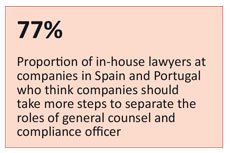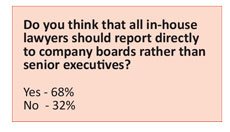Under pressure
The stress-levels of in-house lawyers are rising as they face dwindling budgets, the challenge of combining general counsel and compliance officer roles and the increased blurring of ethical boundaries – is the life of a general counsel becoming less attractive?
The life of an in-house lawyer is an increasingly stressful one. General counsel are having to cope with more pressure as their legal budgets are cut and they become more stretched as their workload increases. The feeling of having to do “more for less” seems ever-present with many general counsel claiming that the legal departments in their organisations are understaffed.
And, according to new research, their worries don’t stop there. Widespread media coverage of cases where in-house lawyers have been held responsible for corporate wrong-doing are also giving general counsel sleepless nights, while the need for some lawyers to combine the role of general counsel and compliance officer is also causing considerable internal conflict. Furthermore, the pressure to be “commercially-minded” means that some lawyers harbour concerns that they are being pushed perilously close to crossing ethical boundaries.
So, what impact are these strains and stresses having on in-house lawyers in Iberia? In an attempt to answer this question, Iberian Lawyer surveyed just under 100 general counsel at leading companies in Spain and Portugal to find out how much pressure they felt they were under, what was making their role more stressful and how it was making them feel about their future career.
The study found that the overwhelming majority of in-house lawyers feel their job has become more pressured in recent years. Ninety per cent of respondents agreed that general counsel are under more pressure than they were prior to the economic crisis. Unfortunately, the bad news doesn’t stop there. Not only do in-house lawyers feel under more pressure, most of them feel that the stress associated with their role is only going to worsen in future. A total of 57 per cent of respondents said they thought that the pressure experienced by in-house lawyers was going to increase.
 Proving your worth
Proving your worth
So, what is it about the role that makes in-house lawyers feel so ill at ease? The most commonly cited factor causing general counsels’ current discomfort was “having to manage with a reduced legal budget”, which was highlighted by three-quarters (74 per cent) of respondents. As one survey participant went on to elaborate: “We have to do more with less, we face increasing workloads and we also have to manage the pressure to demonstrate value to our organisation.”
Another common concern is “increased time pressure”, which was highlighted by nearly half (47 per cent) of respondents. A number of survey participants believed the legal department at their company was understaffed. As one survey respondent put it, “sometimes there are fewer in-house lawyers in organisations than are truly necessary”. The tendency for organisations to increasingly rely on in-house legal teams to carry out work that may have previously been outsourced to external firms was also referenced. “The in-house legal department is covering more, with more and more issues each year being handled within the company,” said one respondent.
However, a significant proportion of survey participants said news of in-house lawyers being implicated in corporate wrongdoing was also causing considerable anxiety. A total of 43 per cent of respondents said that high profile cases of in-house lawyers being held responsible for companies’ regulatory breaches was increasing pressure on general counsel. Meanwhile, another cause of concern was pressure on in-house lawyers to not only perform the role of general counsel, but also of compliance officer. Almost half (46 per cent) of survey participants said combining the two roles was a problem. Consequently, it comes as no surprise that the vast majority (77 per cent) of general counsel believe companies “should take more steps” to separate the roles of general counsel and compliance officer.
 Ethical dilemmas
Ethical dilemmas
Meanwhile, the expectation that in-house lawyers should be business-oriented is the root of a number of problems experienced by general counsel. A third of respondents (33 per cent) said that the pressure to be commercially-minded increased the possibility of being forced to “compromise your professional ethics”. Meanwhile, 25 per cent of survey participants said they felt under increased pressure due to “the feeling that you will be unpopular with non-lawyer colleagues as a result of being viewed as risk averse”.
On the issue of professional ethics, three-quarters (73 per cent) of general counsel are certain about the ethical considerations associated with their job. However, what is concerning is that one in four in-house lawyers (27 per cent) think the ethical boundaries of their role are not clearly defined. One respondent commented: “Although an affinity with the business is essential for an in-house lawyer, and sometimes the lawyer’s tasks are intertwined with the business’ objectives, it is key for in-house lawyers to have clear ethical boundaries and responsibilities as legal advisers.”
Despite the pressures associated with being an in-house lawyer, two-thirds (66 per cent) of respondents said they were more satisfied professionally than when they started their career. A total of 29 per cent said they experienced “about the same” levels of satisfaction as when they began working as a lawyer, with just five per cent saying they were less satisfied professionally than when they started their career. By way of an indication of the longevity of the careers of the survey participants, 61 per cent said they had been an in-house lawyer for 10 years or more, with a further 20 per cent having been in the role for six to nine years.
Similarly, although the role of an in-house lawyer is becoming more pressured, a massive 93 per cent of respondents said they would recommend a career as a general counsel to a friend or family member. As one survey participant remarked: “The pressure is increasing, but the role is motivating and challenging.”
Others suggested that the levels of stress afflicting general counsel were no higher than that experienced by other employees within organisations. “In-house counselling is being put under pressure due to the crisis, but no more than other functions within the company,” remarked one survey respondent.
 Trying to escape
Trying to escape
That said, the results of the research indicate that one in three general counsel is not satisfied with their current job. A total of 35 per cent of respondents said they would prefer not to remain in their current role. A quarter of survey participants (25 per cent) want to move to “become an in-house lawyer in a different organisation”, five per cent want to move to a law firm, with a further five per cent wanting to “begin a completely new career outside the law”. One in four (24 per cent) admitted that they were becoming “more inclined to move into private practice or a different job altogether”. The same proportion (24 per cent) said they thought in-house lawyer roles are becoming less attractive to lawyers. One participant said they wanted to become an “independent director”, while another remarked that they wanted a “new career that still deals with the law”.
However, while it seems that, in general, young lawyers are still attracted to in-house roles, there is a suggestion that this is because the alternative – that is working in private practice – is even less appealing. Do lawyers really want to become general counsel, or is it just the least bad option available to them? One respondent said: “In house careers are still attractive to young lawyers, but part of it comes from the lack of work-life balance at law firms – it is law firms that need to step up in my opinion.”










